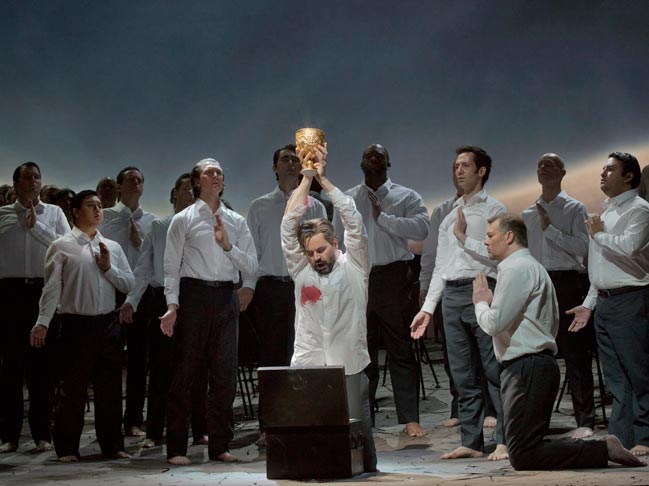
Met Music Director Designate Yannick Nézet-Séguin conducts Wagner’s transcendental score, in François Girard’s remarkable production, a mystical theatrical journey. Tenor Klaus Florian Vogt, renowned across Europe, returns to the Met following his appearances in the 2016–17 season as Florestan in Fidelio. Evelyn Herlitzius is Kundry, and Peter Mattei and René Pape bring back their highly praised interpretations of Amfortas and Gurnemanz, respectively.
Dates Feb 5 – Feb 27 2018

Premiere: Bayreuth Festival House, 1882. Wagner’s final opera is a musical journey unlike any other. The composer preferred to call his mature works “music dramas” to distinguish them from “conventional” opera, but he set Parsifal even further apart by naming it a Bühnenweihfestspiel, a “festival play for the consecration of a stage”—the stage in question being that of the Bayreuth Festival House. The opera tells the tale of a young man who is destined to renew a brotherhood of knights charged with guarding the relics of Christ’s last days. The psychological, mythical, and mystical possibilities of such a story are obvious, and Wagner’s accomplishment results in an air of reverence that surrounds this piece.
Cast
Yannick Nezet-Seguin – Conductor
John Keenan – Conductor
Klaus Florian Vogt – Parsifal
Peter Mattei – Amfortas
Evgeny Nikitin – Klingsor
Rene Pape – Gurnemanz
Creators
Richard Wagner (1813–1883) was the complex, controversial creator of music-drama masterpieces that stand at the center of today’s operatic repertory. Born in Leipzig, Germany, he was an artistic revolutionary who reimagined every supposition about music and theater. Wagner insisted that words and music were equals in his works. This approach led to the idea of the Gesamtkunstwerk, or “total work of art,” combining music, poetry, architecture, painting, and other disciplines, a notion that has had an impact on creative fields far beyond opera.
Francois Girard – Production
Peter Flaherty – Video Designer
Michael Levine – Set Designer
Carolyn Choa – Choreographer
Thibault Vancraenenbroeck – Costume Designer
David Finn – Lighting Designer
Setting
Parsifal takes place in and around the sanctuary of the knights of the Holy Grail, at the mythical location of Monsalvat in Spain, during the Middle Ages. This new Met production places the action in an unspecified, timeless setting.
Music
The score of Parsifal is an extraordinary blend of musical transcendence and dramatic cohesion. The use of bells and offstage choruses are among the unusual effects that create an almost liturgical atmosphere. The magnificent and expansive prelude conveys the important role the orchestra will play in creating a world in which time itself is experienced in an unusual way. The vocal parts call for superior breath control to sustain the long melodic lines. Many passages demand a high degree of sheer lyrical beauty, but there are also jarringly dramatic moments, as well. While the score of Parsifal contains endless opportunities for musicological study, perhaps its most notable feature is its approachability. As Wagner’s wife Cosima commented, “It’s all so direct!”
More Opera’s
On Stage 2017–18
La Boheme
Cavalleria Rusticana & Pagliacci
Cendrillon
Les Contes d’Hoffmann
Cosi fan tutte
Elektra
L’Elisir d’Amore
The Exterminating Angel
Hansel and Gretel
Lucia di Lammermoor
Luisa Miller
Madama Butterfly
The Magic Flute
The Merry Widow
National Council Grand Finals Concert
Norma
Le Nozze di Figaro
Parsifal
Requiem
Romeo et Juliette
Semiramide
Thais
Tosca
Il Trovatore
Turnandot
Die Zauberflote













































